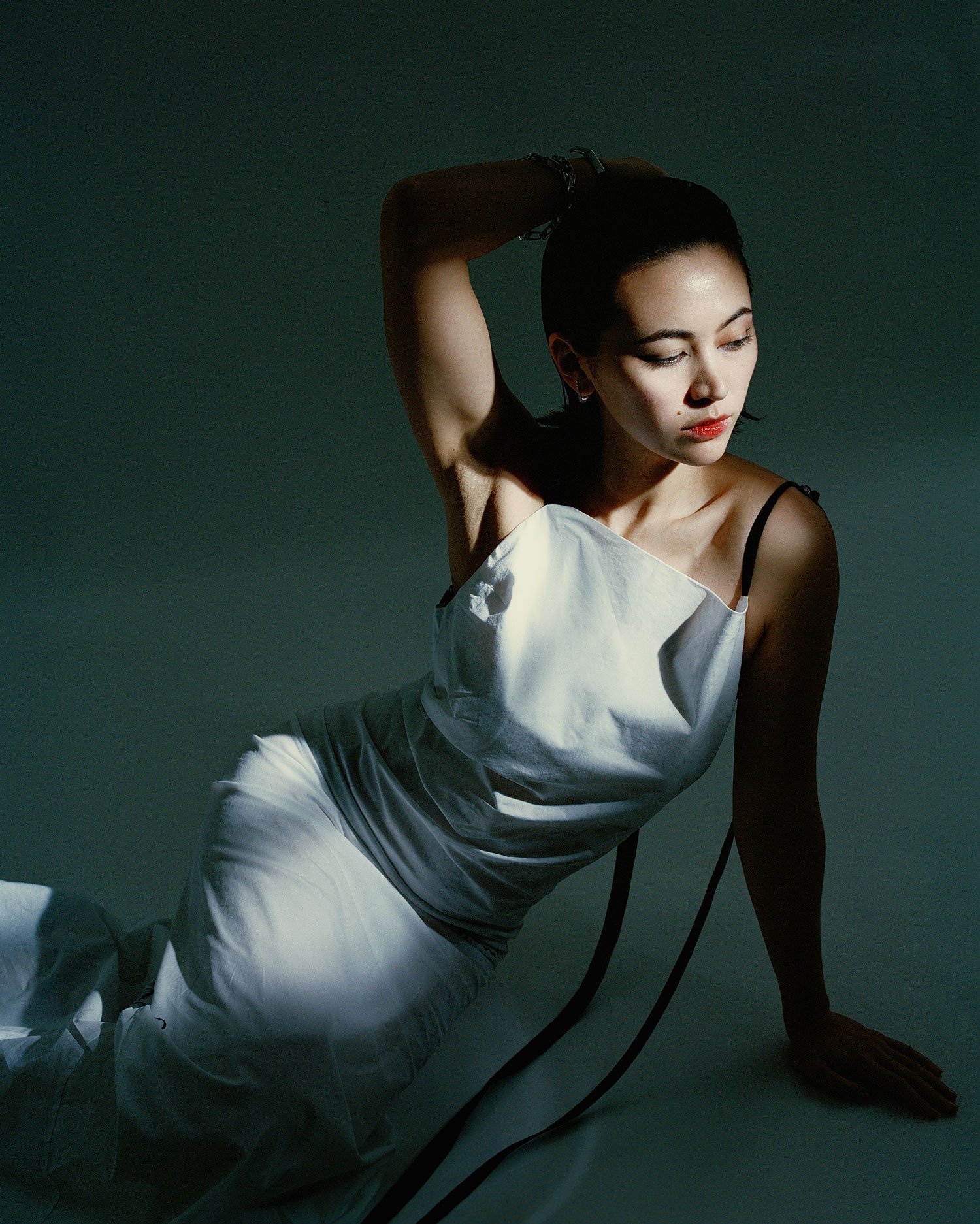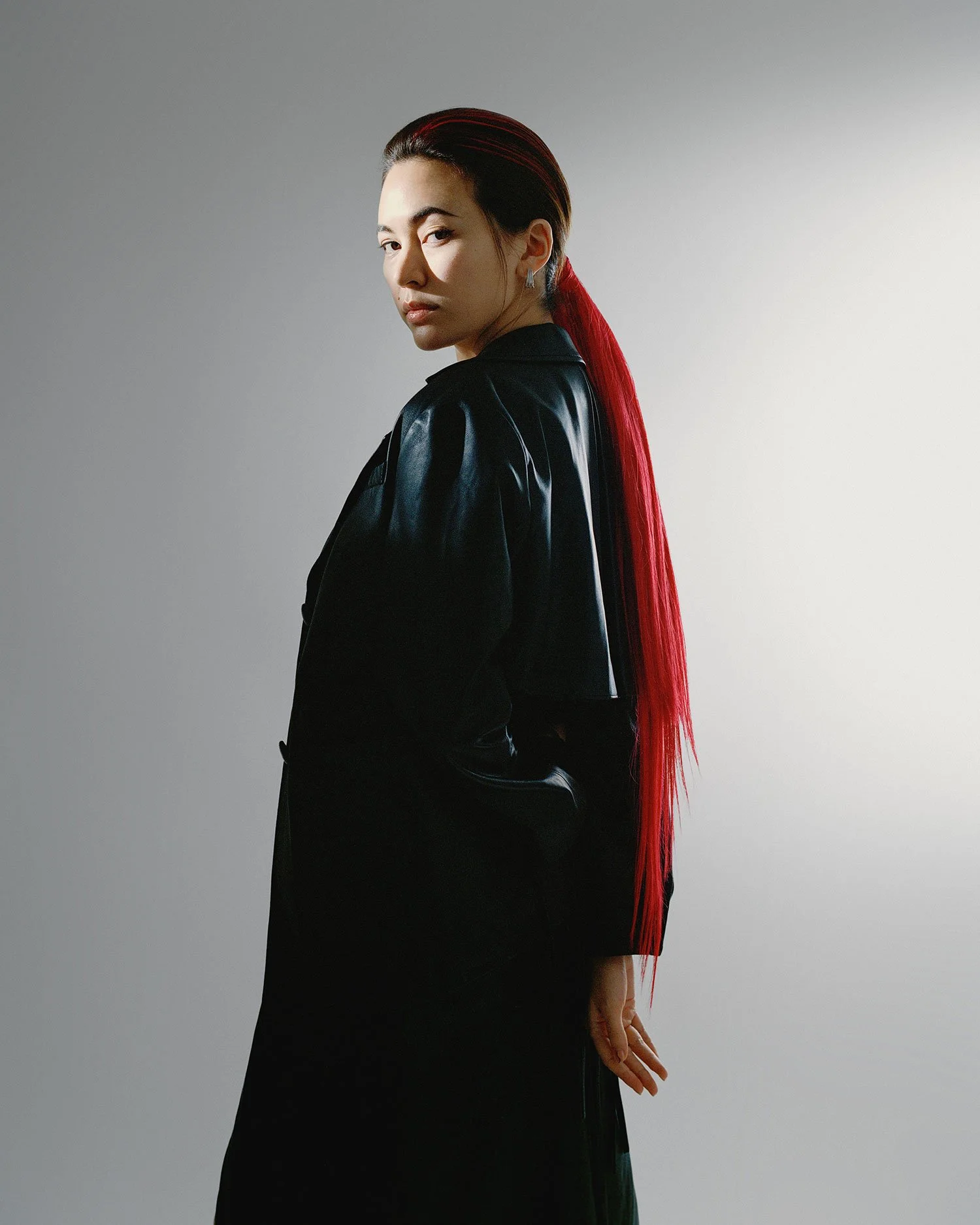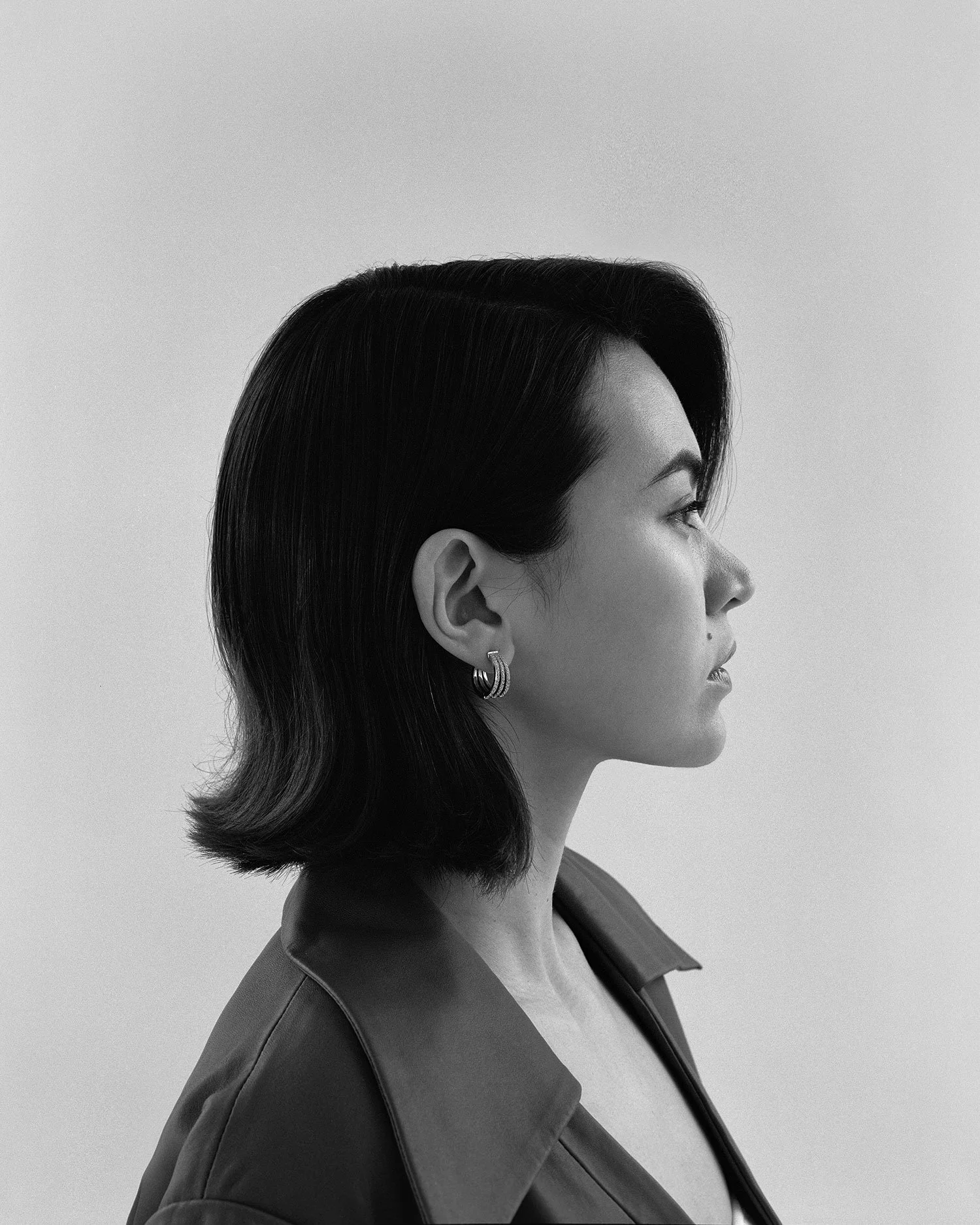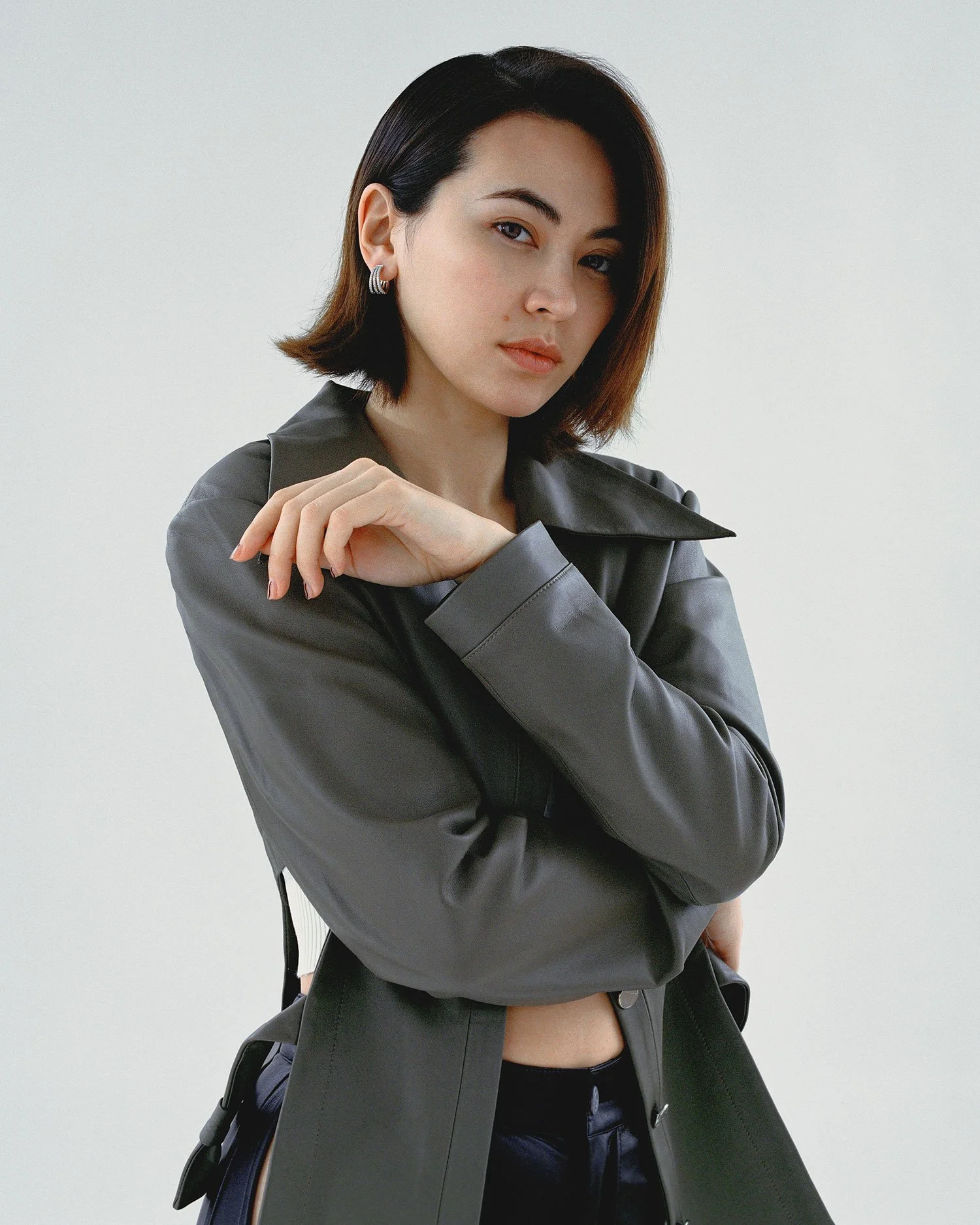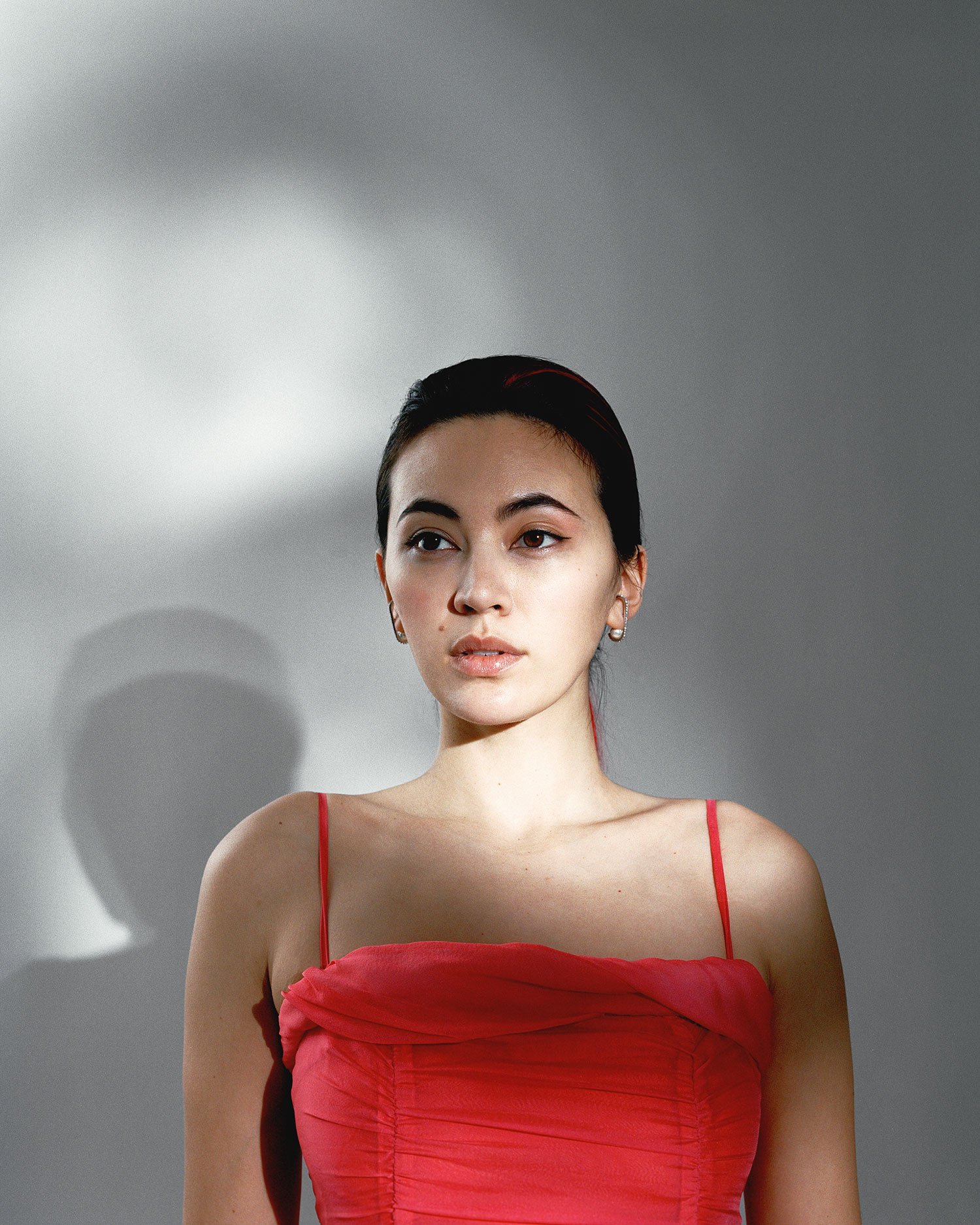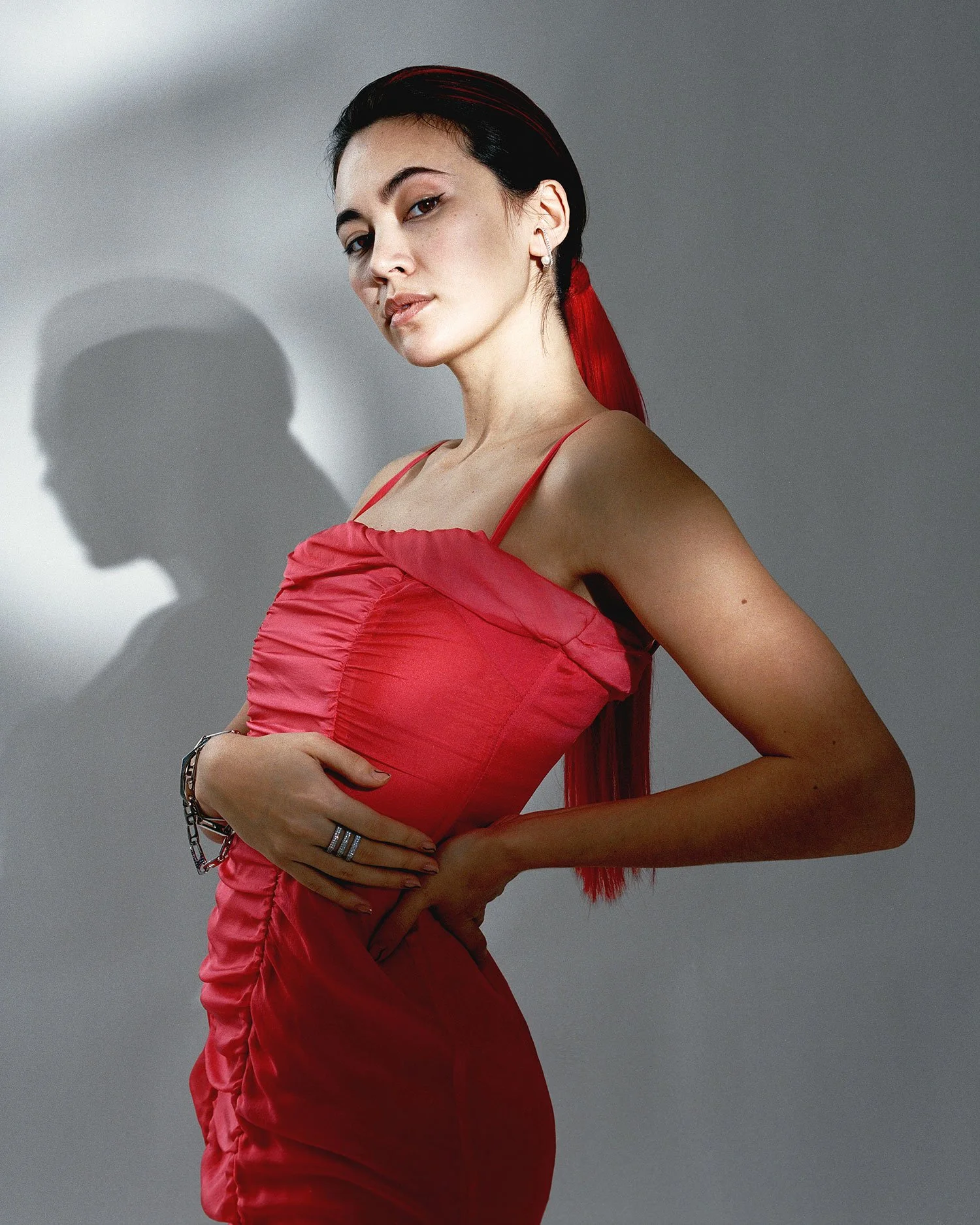JESSICA HENWICK
Having collaborated with prevalent directors including Sofia Coppola and Lana Wachowski, Jessica Henwick uncovers her adventure as a British-Asian actor in the Western film industry.
Dress ANN DEMEULEMEESTER,
earrings MAISON DE JEWELS,
ring & bracelet MI MANERA
PHOTOGRAPHER OTTO MASTERS
STYLIST LYLA CHENG
INTERVIEWER JANE ZHENG
“Who’s that blue-haired woman?” The release of the first The Matrix Resurrections trailer sparked curiosity about the British-Asian actress, Jessica Henwick, who plays Bugs in the latest film of this phenomenal scifi series. Best known for her role as Nymeria Sand in Game of Thrones and Colleen Wing in Iron Fist, the 28-year-old is another breakout star representing the endless possibilities that actors of Asian descent hold.
“There’s a purity to writing that I really like – you’re the master of your own universe.” Though Henwick is more often referred to as an actor, she is also largely involved in the off-camera moments of filmmaking. Seeing herself as both a writer and an actor, her writing projects include a Nancy Drew spin-off for Amazon, titled Nancy Wu Done it, and the Busgirl movie that will be released later this year. Henwick is not the first actor to work both on and offscreen, however what sets her apart is her passion and leadership in the ongoing discussion regarding diversity offscreen. “We are starting to see it onscreen, but we need more women in studio-exec positions, more people of colour, different ages and different mindsets…We need a variety!” She highlights an often-overlooked fact: without representation behind the scenes, the stories of those underrepresented will never be reflected in popular culture.
Dress ANN DEMEULEMEESTER,
shoes NICHOLAS KIRKWOOD,
earrings MAISON DE JEWELS,
ring & bracelet MI MANERA
Some criticise the recent success of Asian films as being a symptom of political correctness or, at the very least, a result of the pressure to be more politically correct. We’re undergoing a prevailing period of cancel culture and political correctness, yet critics seem to forget the over-saturation of entertainment in the current digital age. The achievement of films like Minari and Parasite originate from a specific perspective of storytelling that viewers crave. The success of these films aren’t due to trends, as people aren’t trends. The success of these films is attributed to their ability to resonate and to communicate with audiences. Good cinema, good art, good media isn’t always “good” because of its political motivations, rather it’s often revered because it exists as something people relate to or, in most cases, simply something that is enjoyable. “Everyone’s looking for something that stands out, something that’s different – no one wants to look at the regurgitation of the same stories,” Henwick explains. The fresh and the unseen is what catches the audience’s eye, and what inspires Henwick to continue writing in the unique perspective of her British-Asian identity.
Jacket LETOIT,
skirt CHARLOTTE NG,
earrings MAISON DE JEWELS
Acting and writing are both forms of storytelling, where the course of feedback remains surprisingly alike. “One is on your body, and one is on the page. It’s both art, but that’s where the similarities end. The emotional rollercoaster you go through is different,” Henwick shares. What draws her into writing is that first look at the blank page: a moment that’s filled with depth but also a sense of control. With a pen and a piece of paper, you gain the power to navigate a fictional world – an environment for self-expression. Though Henwick’s descriptions of writing are so appealing you would not be mistaken to think that she has an obvious preference, she clearly states that she will never consider giving up acting – a supportive reassurance to her fans. “I’ve been doing acting more than writing and I’ll always return to it – that’s a given.”
Jacket LETOIT,
earrings MAISON DE JEWELS.
Behind the scenes of Busgirl
If there’s one project that has been hotly anticipated by Henwick and her fans, it’s Busgirl without a doubt. A project that started last summer, it’s a fifteen minute long short film about the challenges that June, an aspiring young female chef, faces in the cutthroat industry of high-end cuisine. The theme of the film was chosen to be food after Henwick first heard from Xiaomi, the Chinese consumer electronics giant, which also functioned as the camera of the whole shooting process. “Like everyone else, over lockdown I became obsessed with cooking, and it built from there. I wanted to make something like Wong Kar Wai’s Chungking Express, a love poem to food,” Henwick explains. Chungking Express is a classic in using motifs and poetic reflections of food to link characters. Inspired by another trailblazer in Asian cinema, Henwick has whet our appetite for her exciting directorial debut.
What makes Busgirl stand out even more is its daring experiment to shoot the entirety of the film with a phone. Although it’s a decision that originates from Xiaomi’s sponsorship, Henwick does not regret it, but rather recognises the benefits – pioneering unusual methods of filmmaking. Compared to a usual camera rear, the miniature size of the phone expanded the potentials of filming in a crammed kitchen. “I was able to have one camera operator pass it to another, through the kitchen shelves then into a pan, out of the other side and past a fire…if we had filmed that with a normal camera, we would’ve had to CG it all because it wouldn’t have been safe.” Busgirl is an example of how directors are adapting with technology to depict fresher perspectives, and Henwick, never backing down, leads the evolution behind the scenes.
Yet, as smooth as it sounds, the filming process of Busgirl was a challenge. Originally casting another East Asian actress to play June, the plan had to be reconsidered under Covid restrictions and a continuous change of schedule. With no time to waste, Henwick had to cast herself, as it was the easiest, most reliable and realistically the only option left during this unstable period. “It’s not my preferred method… I don’t think I’ll do it again.” Henwick’s reluctance to be both the director and actor simultaneously for future projects stems from the confusion this dual identity brings on set. “I’m in the scene, then I’ll have to cut it; go to the monitor; watch it on another phone; give notes to everyone; give notes to myself; then go back into the scene and into that frame of mind.” The consequence is evident – filming was slowed down. Though frustrating at times, the whole shooting process was wrapped up within three days. Henwick recollects the treasured memories of Busgirl with her passion to cinema: “if you love what you do, it doesn’t feel like work”.
Jacket LETOIT,
trousers VELVET GLOVES,
earrings MAISON DE JEWELS.
Off-scene to on-scene
It’s never easy to choose your own favourite role. The same applies to Henwick: “they’re all so different and I love them for different reasons”, she says in a recall of her career. Nonetheless, it’s indisputable that Bo in Spirit Warriors was a turning point for Henwick and her Asian comrades. As the first actor of East Asian descent to play a lead role in a British television series, this was the beginning to her journey of breaking barriers. “If I’ve taken a role, it’s for a reason” – her role as Amy Lang in the TV series Silk is the most telling example. Always conscious about topics of abuse, Henwick depicted how a barrister pupil suffered sexual harassment in the work-place prior to the #metoo movement. Against stereotypes, she initiates change off-scene too, shining a spotlight on the marginalised and less-discussed.
Equally, her untitled mini-series set in the UK in 1913 draws attention to similar issues. Based on the first mixed-raced British Chinese people in upper class society during that era, she wrote the series with a desire to see a more ethnically conscious version of Downtown Abbey. “People just don’t think Asians were in England at that time”, Henwick explains, “it’s definitely one of the projects that I’d like to pursue if I have a second.”
Acting from an early age, Henwick is part of a generation that have been witnesses to change in the film industry. From ethnically ambiguous casting to specific diverse storytelling, the direction that cinema is moving towards is promising. Still, she concludes the change was “gradual in a bad way.” The approach to no longer design stereotypical Asian characters that were either white-washed or the ‘quiet nerd’ only arrived when studio executives received an unimagined intense level of backlash. The truth is: those of Asian descent still suffer from the ethnic labels imposed upon them. This explains why Henwick continues to emphasise the necessity of changing from within the industry – our stories need to be written, presented, and seen.
Dress REJINA PYO,
earrings MAISON DE JEWELS,
ring & bracelet MI MANERA
“It’s all about balance”
When asked about anticipations for the future, Henwick preferred to not give an ambitious response to our readers. “I’m going to take a really nice and long Christmas holiday”, she answers instantly. Throughout her career, she had to be proactive to be seen – often causing herself intense pres-sure. Her desire to be acknowledged has always been strong. In comparison to those from more commonly represented communities (typically those who are white or white-passing) the effort required by an Asian actor to simply be included on screen in Western media is immense. Frustration towards the inequality that have always existed in Western cinema was one of Henwick’s motivators. But there are things in life that need patience, and we should never put off living our real life in the pursuit of a career.
Rounding off all the press-tours for The Matrix Resurrections and pre-launch preparations for the Busgirl movie, Henwick has decided to enter 2022 undisturbed. Learning from past experiences, she shares an enlightening piece of advice that we all should keep in the forefront of our minds, “Enjoy life! It’s okay to take a break, there’s nothing wrong with that.”
This profile was published in The WOW N° 6.
Issue6 available now.
Talent: JESSICA HENWICK
Photographer: OTTO MASTERS
Stylist: LYLA CHENG
Hair: JASON GOH
Make-up: NAOMI HASHIDA
Casting Director: ANGELIKI SOFRONAS
Photography Assistant: CONNOR EGAN

